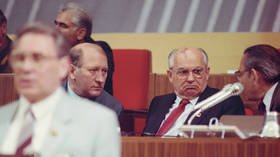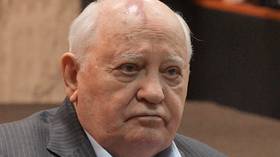Would life be better if Gorbachev's Perestroika reform never happened? Almost half of today's Russians say yes, reveals new poll

Praised in Washington, President Gorbachev’s 1985 flagship Perestroika policy was welcomed with open arms by the West. Now, in 2020, almost half of Russia believes that the country would be better off if it had never happened.
According to a poll by the Levada Center, 47% of Russians believe that life in the country was better before Perestroika, with just 39% disagreeing. When isolating the responses of those over the age of 55, all of whom were adults when the reforms began in 1985, almost two-thirds (61%) agreed that life was better before.
Perestroika, which means “restructuring,” was a package of reforms to the Soviet economy, adopting elements of liberal economics and the free market. Although Gorbachev was supported by Western countries, the move has been blamed for creating food shortages and social tensions within the USSR, with some historians citing the policy as a reason for the country's breakup and the eventual collapse of the Eastern Bloc.
Also on rt.com ‘Things will get worse for us in Russia’: Russian Communist leader warns of consequences if Lukashenko is overthrownThe same question has been regularly asked by the Levada Center since 1995. In March 1995, 53% of Russians said life was better before Perestroika, which dropped to a low of 31% in February 2008. In the last 12 years, the number has increased to almost a half.
The pollsters also discovered that a majority of Russians believe that the USSR was a strong and unified state (65%), with over two-fifths (43%) of respondents saying that people treated each other better during the Soviet era.
Named after its founder, the late Yuri Levada, the Levada Center polling company has often been accused of liberal bias. In 2016, it was accused of “performing the functions of a foreign agent” by authorities. It has also admitted to receiving western funding in the past.
If you like this story, share it with a friend!














